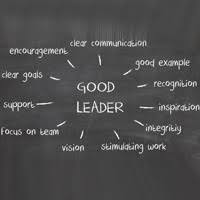The Importance of Leadership Skills
Leadership skills are essential in every aspect of life, whether it’s in the workplace, at school, or within a community. Effective leadership can inspire and motivate others, drive positive change, and achieve common goals. Here are some key reasons why leadership skills are crucial:
Vision and Direction
A good leader has a clear vision of where they want to go and can articulate this vision to others. They provide direction, set goals, and create a roadmap for success. By having a vision and direction, a leader can guide their team towards achieving common objectives.
Communication
Effective communication is at the core of strong leadership. Leaders need to be able to convey their ideas clearly, listen actively to others, and provide feedback in a constructive manner. Clear communication fosters trust, collaboration, and understanding among team members.
Decision-Making
Leaders often face tough decisions that can impact their team or organization. Good leadership involves making informed decisions based on data, input from others, and critical thinking skills. Strong leaders are decisive yet open to feedback and willing to adapt their decisions when necessary.
Motivation
A great leader knows how to motivate and inspire their team members to perform at their best. By recognizing individual strengths, providing encouragement, and offering support when needed, leaders can boost morale and productivity within the group.
Problem-Solving
In any setting, challenges will arise that require creative solutions. Leaders with strong problem-solving skills can analyze situations effectively, brainstorm innovative ideas, and implement strategies to overcome obstacles. Being able to navigate through adversity is a hallmark of effective leadership.
Empowerment
An important aspect of leadership is empowering others to take initiative and develop their own skills. By delegating tasks appropriately, providing opportunities for growth, and fostering a culture of trust and autonomy, leaders can cultivate a team of capable individuals who contribute meaningfully to the collective effort.
In conclusion, leadership skills play a vital role in guiding individuals and groups towards success by providing vision, communication, decision-making abilities,
motivation,
problem-solving techniques,
and empowerment.
Developing these skills not only benefits the leader but also enhances the overall effectiveness
and cohesion
of the team or organization they lead.
Top 5 Frequently Asked Questions About Leadership Skills
- What are the key qualities of a good leader?
- How can I improve my leadership skills?
- What is the difference between leadership and management?
- Why are leadership skills important in the workplace?
- Can leadership skills be learned or are they innate?
What are the key qualities of a good leader?
When considering the key qualities of a good leader, several traits stand out as essential. Effective leaders demonstrate strong communication skills, enabling them to convey their vision clearly and engage with team members effectively. They also exhibit empathy and understanding, showing compassion towards others and building trust within the team. A good leader is decisive, able to make tough decisions with confidence while remaining open to feedback and willing to adapt when necessary. Additionally, great leaders inspire and motivate others, fostering a positive work environment and encouraging team members to reach their full potential. Ultimately, a combination of communication, empathy, decisiveness, and inspiration forms the foundation of what it takes to be a successful leader.
How can I improve my leadership skills?
Improving leadership skills requires a combination of self-awareness, continuous learning, and practical application. One effective way to enhance leadership abilities is to seek feedback from peers, mentors, or supervisors to gain insights into strengths and areas for development. Engaging in leadership training programs, workshops, or reading relevant literature can provide valuable knowledge and tools to refine leadership techniques. Additionally, practicing empathy, active listening, and effective communication in everyday interactions can help build strong relationships and trust within a team. Embracing challenges, taking on new responsibilities, and learning from both successes and failures are also key elements in the journey of improving leadership skills. By committing to personal growth and consistently striving for excellence in leadership practices, individuals can cultivate their abilities and make a positive impact in their roles.
What is the difference between leadership and management?
Many people often wonder about the distinction between leadership and management. While both roles are crucial in organizational settings, they involve different approaches and responsibilities. Leadership focuses on inspiring and influencing others to achieve a common vision or goal. Leaders often set the direction, motivate team members, and foster innovation and growth. On the other hand, management involves planning, organizing, and controlling resources to ensure that tasks are completed efficiently and effectively. Managers typically focus on implementing strategies, coordinating activities, and monitoring progress towards specific objectives. In essence, leadership is about guiding people towards a shared purpose, while management is more concerned with coordinating resources and processes to achieve desired outcomes. Both roles are essential for driving success in any organization, each contributing unique strengths to the overall functioning of a team or company.
Why are leadership skills important in the workplace?
Leadership skills are crucial in the workplace for several reasons. Firstly, effective leadership fosters a positive work environment by inspiring and motivating employees to perform at their best. Strong leaders provide direction, set goals, and offer guidance, which helps align individual efforts with organizational objectives. Additionally, leadership skills enhance communication within teams, leading to better collaboration and increased productivity. Good leaders also possess decision-making abilities that can drive innovation, solve problems efficiently, and adapt to changing circumstances. Ultimately, leadership skills are important in the workplace as they contribute to employee engagement, team cohesion, and overall organizational success.
Can leadership skills be learned or are they innate?
The question of whether leadership skills are learned or innate is a common one in discussions about leadership development. While some individuals may naturally possess certain qualities that make them effective leaders, such as charisma or communication skills, leadership is ultimately a skill that can be cultivated and honed through learning and experience. Leadership development programs, mentorship opportunities, self-reflection, and continuous growth all play a significant role in enhancing one’s leadership abilities. By actively seeking to improve and refine their leadership skills, individuals can become more effective leaders regardless of their initial aptitude, demonstrating that leadership is indeed a skill that can be learned and developed over time.



